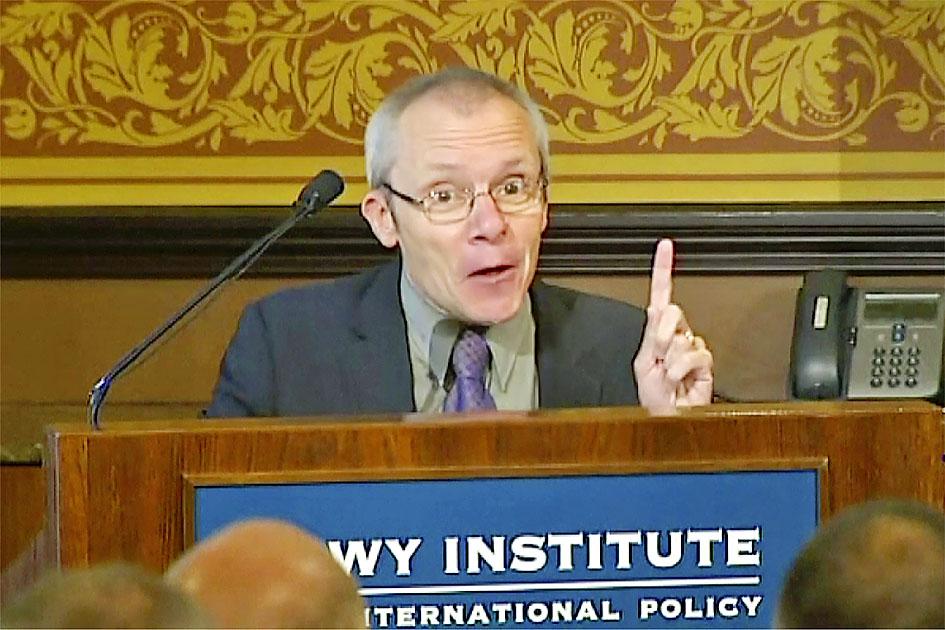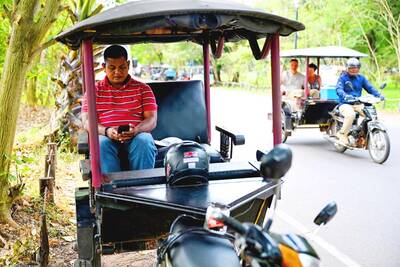A court in Myanmar on Thursday ruled that it would not allow a Burmese-English translator at the upcoming trial of Sean Turnell, an Australian economist who has been charged under the Official Secrets Act.
Turnell is to be tried with the nation’s ousted leader, Aung San Suu Kyi, and three former Cabinet members charged in the same case.
Turnell had served as an adviser to Aung San Suu Kyi and was arrested with his codefendants after her elected government was ousted by the army in February.

Photo: AP / Australian Broadcasting Corp
Violating the secrets law carries a maximum penalty of 14 years in prison. The colonial-era statute criminalizes the possession, collection, recording, publishing, or sharing of state information that is “directly or indirectly, useful to an enemy.”
The ruling forbidding a translator was issued at a pre-trial hearing at a special court in the capital, Naypyidaw, said Ye Lin Aung, Turnell’s lawyer.
All five defendants were present for the hearing, which was closed to the public and media.
He said the prosecution had asked that no translator be allowed and the judge agreed, citing security reasons.
The exact details of Turnell’s alleged offense and those of the others have not been made public, although Myanmar state television, citing government statements, has said the Australian academic had access to “secret state financial information” and had tried to flee the country.
“It is difficult for us without an interpreter for him [Turnell] at the court,” Ye Lin Aung said. “I am going to discuss it with officials from the Australian embassy.”
He added that Turnell, who is confined at a prison in Naypyitaw, appeared to be in good health and requested that he be sent some snacks and other articles.
The case is one of several faced by Aung San Suu Kyi and is widely seen as an effort to discredit her to prevent her return to politics.

The death of a former head of China’s one-child policy has been met not by tributes, but by castigation of the abandoned policy on social media this week. State media praised Peng Peiyun (彭珮雲), former head of China’s National Family Planning Commission from 1988 to 1998, as “an outstanding leader” in her work related to women and children. The reaction on Chinese social media to Peng’s death in Beijing on Sunday, just shy of her 96th birthday, was less positive. “Those children who were lost, naked, are waiting for you over there” in the afterlife, one person posted on China’s Sina Weibo platform. China’s

‘NO COUNTRY BUMPKIN’: The judge rejected arguments that former prime minister Najib Razak was an unwitting victim, saying Najib took steps to protect his position Imprisoned former Malaysian prime minister Najib Razak was yesterday convicted, following a corruption trial tied to multibillion-dollar looting of the 1Malaysia Development Berhad (1MDB) state investment fund. The nation’s high court found Najib, 72, guilty on four counts of abuse of power and 21 charges of money laundering related to more than US$700 million channeled into his personal bank accounts from the 1MDB fund. Najib denied any wrongdoing, and maintained the funds were a political donation from Saudi Arabia and that he had been misled by rogue financiers led by businessman Low Taek Jho. Low, thought to be the scandal’s mastermind, remains

Australian Prime Minister Anthony Albanese yesterday announced plans for a national bravery award to recognize civilians and first responders who confronted “the worst of evil” during an anti-Semitic terror attack that left 15 dead and has cast a heavy shadow over the nation’s holiday season. Albanese said he plans to establish a special honors system for those who placed themselves in harm’s way to help during the attack on a beachside Hanukkah celebration, like Ahmed al-Ahmed, a Syrian-Australian Muslim who disarmed one of the assailants before being wounded himself. Sajid Akram, who was killed by police during the Dec. 14 attack, and

VISHNU VANDALS: A Cambodian official accused Thailand of destroying a statue in a disputed border area, with video showing the Hindu structure being torn down The Thai military said ceasefire talks with Cambodia, set to begin yesterday, are expected to conclude with a meeting of the countries’ defense ministers on Saturday, as the two sides seek to end weeks of deadly clashes. The talks started at 4pm in Thailand’s Chanthaburi Province, which borders Cambodia. The Thai Ministry of Defense outlined several demands to be discussed ahead of the bilateral meeting of the General Border Committee (GBC) on Saturday. If secretariat-level discussions fail to reach agreement on key technical frameworks such as troop deployments, the Thai side would not proceed with the GBC meeting or sign any agreement on